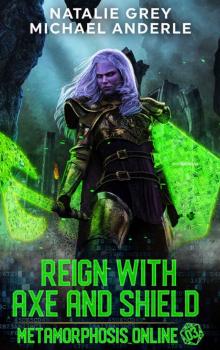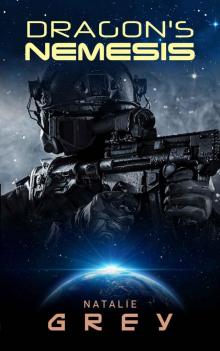- Home
- Natalie Grey
Defender (The Vigilante Chronicles Book 6)
Defender (The Vigilante Chronicles Book 6) Read online
Defender
The Vigilante Chronicles™ Book Six
Natalie Grey
Michael Anderle
Defender (this book) is a work of fiction.
All of the characters, organizations, and events portrayed in this novel are either products of the author’s imagination or are used fictitiously. Sometimes both.
Copyright © 2018 Natalie Grey and Michael Anderle
Cover by Jeff Brown, http://jeffbrowngraphics.com/
Cover copyright © LMBPN Publishing
A Michael Anderle Production
LMBPN Publishing supports the right to free expression and the value of copyright. The purpose of copyright is to encourage writers and artists to produce the creative works that enrich our culture.
The distribution of this book without permission is a theft of the author’s intellectual property. If you would like permission to use material from the book (other than for review purposes), please contact [email protected]. Thank you for your support of the author’s rights.
LMBPN Publishing
PMB 196, 2540 South Maryland Pkwy
Las Vegas, NV 89109
First US edition, October 2018
The Kurtherian Gambit (and what happens within / characters / situations / worlds) are copyright © 2015-2018 by Michael T. Anderle and LMBPN Publishing.
Contents
Chapter 1
Chapter 2
Chapter 3
Chapter 4
Chapter 5
Chapter 6
Chapter 7
Chapter 8
Chapter 9
Chapter 10
Chapter 11
Chapter 12
Chapter 13
Chapter 14
Chapter 15
Chapter 16
Chapter 17
Chapter 18
Chapter 19
Chapter 20
Chapter 21
Chapter 22
Chapter 23
Chapter 24
Chapter 25
Chapter 26
Chapter 27
Chapter 28
Epilogue
Author Notes - Natalie Grey
Books by Natalie Grey
Books by Michael Anderle
Connect with the authors
The Defender Team
Thanks to our JIT Readers
Mary Morris
Danika Fedeli
Peter Manis
John Ashmore
Keith Verret
Diane L. Smith
Angel LaVey
Daniel Weigert
Kelly Ethan
Tracey Byrnes
If We’ve missed anyone, please let us know!
Editor
Lynne Stiegler
From Natalie
For M and T
From Michael
To Family, Friends and
Those Who Love
To Read.
May We All Enjoy Grace
To Live The Life We Are
Called.
Chapter One
There were a number of high-tech strategies available to someone who was hoping to avoid surveillance.
After all, for a Jotun, surveillance and sabotage were not merely possible, but true dangers. To participate in day-to-day life with other species, a Jotun must wear a mechanical suit fitted with a central tank that would hold the Jotun’s jellyfish-like body. They used the suits like others would use their bodies, but those in higher-end and more specialized suits were also able to send and receive messages, use weapons embedded in the suits, and scan people, machines, and objects.
This made the suits vulnerable. The Jotun government had extensive protocols in place to keep matters of state from being spied upon. Otherwise, the suits could be hacked to send all speech to a third party, or make the weapons malfunction, or track the Jotun’s movement.
The Jotuns had, of necessity, evolved some of the most complex computer systems in this sector. Very few other species posed a true threat to them in that regard, it was mostly their own homegrown hackers and vigilantes that they feared.
When Jeltor went back to Jotuna, therefore, seeking out the top brass of the Navy to help him expose the Senate’s latest treason, he spent a good deal of time trying to figure out how to escape surveillance.
Admiral Jeqwar chose an option he would never have anticipated: she found several old, discarded biosuits and cleaned them up just enough to be habitable. They were so old that their computers barely functioned beyond providing life support. Hacking them would be an exercise in frustration, and it was unlikely that any of the Senate’s hackers even knew the programming languages these suits ran on.
Jeltor admired the admiral’s plan, but the suits were damned uncomfortable. He was used to his own suit, which he had modified extensively over the years. Without scanners, communications capabilities, or weapons, he felt naked.
Also, cold. This suit did not calibrate temperature the same way his did.
He bobbed in the water uncomfortably as they walked toward the waterfront. Some of the admiral’s aides were trailing after them, and Jeltor was sure that there were more who were keeping watch, protecting these two revolutionaries.
Jeltor would never have guessed in his youth that the term “revolutionary” would apply to him. He’d joined the Navy when he was young, progressing through the ranks as his mind would allow; Jotun Naval captains each controlled an entire ship during battle, and very few had the mental capacity to control the largest ships. Only a handful in each generation were able to be admirals, who could control an entire fleet.
He had served well once he graduated, becoming known for being decisive and fair, a good captain to the crews that ran his ships when they were not in a battle. He had known about the corruption in the Senate, of course, because everyone knew about it, but he’d had a youthful belief that corruption was inevitable in any civilized species.
In any case, his younger self had thought the Jotuns were better than other species. They should not worry about corruption as long as it did not cost them territories or good trade deals.
Jeltor wanted to slap his younger self for having such insular, ignorant notions. He had first realized some of his errors when he began to interact with other species and found them to be not the brutish savages he’d been told, but intelligent—and even dangerous. This gradual awakening had made him start questioning everything, whether he wanted to or not.
The final straw had come when he was taken hostage by pirates. Rescued by a human named Barnabas, Jeltor had learned the Yennai Corporation, which had infiltrated the Jotun government and was seeking to become the dominant power in the entire sector. Far from fighting it, the Jotun Senate was allowing this and looking the other way. Jeltor had been accused of treason for standing against the Yennai Corporation.
He hadn’t wanted to be a revolutionary. He’d simply stood for what was right, and somehow that had made him one.
Now he spent his time looking over his shoulder for assassins and worrying about surveillance. It seemed like a nightmare, something that would happen to someone else. Unfortunately, it was all too real.
“So,” Admiral Jeqwar said when they reached the waterfront. “Why did you need to meet?”
“Have you ever heard of the Infrastructure Revitalization Committee?” Jeltor asked her.
She turned her biosuit to look at him. “No,” she said cautiously. “But it must be more important than it sounds if you’re here to talk to me about it.”
Jeltor gave a little laugh. “I’ve been thinking the same thing. Unfortunately, I don’t know what it i
s. It was a tip given to us by…well, I don’t know that, either.”
“So you came here to tell me that you’ve received a tip that could mean anything from an anonymous source?”
“Not exactly anonymous.” Jeltor wiggled his tentacles somewhat nervously. “I trust I can say the following in confidence?”
“Yes,” she said wryly. “We’re already under suspicion of treason, and we’ve indubitably committed mutiny. Let’s not get worried about rule-breaking now.”
Despite himself, Jeltor laughed. He had always been a bit in awe of Admiral Jeqwar. She was a legend, and her reputation was well-earned. What he had not expected, when he became part of the resistance against the Jotun Senate, was that she would be forthright and no-nonsense. The Jotuns who could be admirals were so rare and so intelligent that he had assumed she would be very cold and superior, looking down on everyone else.
None of them were like that, it turned out. They were very practical, and had no patience for bullshit. It made Jeltor feel better about the fact that they had led the Navy into mutiny. If he was on their side, he felt he was on the right side.
He was worried that his latest mission, however, might concern even them.
“How much do you know of Huword’s death?” he asked.
She gave him an annoyed glance. “Very little, as well you should know. No one’s said a damned thing.”
“Huword was a traitor,” Jeltor said bluntly. “He was working for the Senate, not only during the mutiny but for other purposes that we don’t even understand yet.” He hated to tell her the truth. Huword had been well-liked.
Despite her practicality, she could not seem to believe this. “Huword?” she asked him bluntly. “Of all people, him?”
“I know.” Jeltor felt a deep pang of sadness. He had believed that Huword was his friend. “I know,” he repeated, “but it’s true. He was working for the Senate, and whatever he was doing, it’s involved—somehow—with the committee I mentioned. And that was why he was assassinated.”
The admiral was no fool. “If you know only parts of this,” she said slowly, “then you clearly weren’t the one who assassinated him.”
“You thought I was?” It was grimly amusing to find out he’d become so infamous that people thought he was off performing vigilante justice, assassinating his fellow Naval captains.
“Our intelligence suggested you were involved somehow.” She gave the ripple that was the Jotun equivalent of a shrug.
“Only after the fact. Barnabas was the one who found out about the murder.”
“Humans again.” Her suit shook its head. “If I’m honest, I don’t like another species being quite so involved in our business.”
Jeltor knew better than to take this as a reprimand. Indeed, he understood it for what it was: a confidence. Jotuns were told from an early age that they were superior to all other species and that they were the lone beacon of true civilization in the sector.
Even once you realized that was false, it was difficult to undo the years of belief.
“I think whoever ordered Huword’s assassination feels the same,” Jeltor told her. “They tried to warn us off. I think the assassin acted without their knowledge when they told us about the committee. We ran into them again when...” He rippled again, worriedly. “When we killed Senator Biset.”
The admiral muttered a quiet oath. “You killed a senator?”
“That wasn’t what we thought we were—” He broke off. Excuses were useless. “Yes,” he said simply. Then, because she was still staring at him, he explained succinctly, “They set a trap for us on Gokrun III, and we managed to get out of it. The assassin helped us kill them; it was the only way to get out of the trap. Then they told us about the committee and left.”
The admiral stared out over the waterfront and said nothing for a long moment.
Hevarod, the capital city of Jotuna, had originally been constructed underwater but had been moved as the Jotuns began developing and testing biosuits. It was now along the coastline of Jotuna’s largest island, and there was a portion of the metropolis that was suitable for aliens. The official business of the government was even conducted in buildings aliens could access, but there were always calls to move things into the ocean and force aliens to wear biosuits to survive there.
“You want us to help you look for this committee,” the admiral said finally. She sounded weary. “I’ll be honest with you, Captain—I do not like learning of all the things my government has done. I do not like it at all.”
Jeltor nodded. There was nothing to say. He agreed fully with the sentiment. None of them wanted to know this. They persevered only because if they didn’t, they would destroy themselves from within. Never had there been a more reluctant group of revolutionaries, he thought. The idea was bitterly amusing.
“Huword was involved in several attacks,” he continued. “They were all on remote colonies, some our own, some along the borders of other species’ territories. They were all blamed on pirates. A few of the civilians were found tortured and killed in some instances. The rest vanished. That probably has something to do with this committee.”
“Probably?”
“The more I learn about Huword, the more I think nothing would surprise me.”
“Then it’s good he’s dead,” she said brutally. “Well, this is a mess. We’ll look into it. We’ll search for anyone who seems to know about it. You’ll be interested to learn that Biset’s death hasn’t been announced. Clearly, someone doesn’t want people looking into his work.”
“Any instructions for me?” Jeltor asked.
She considered. “See if you can find out who had Huword killed. They don’t want any other species to know. Well, if he was abducting civilians, I can see why, but we need to know what they know. Find out what you can, and then come to any of the admirals. We know how to get word to one another outside any of the channels others know about.”
Jeltor nodded. That was good to know.
He took his leave of her, transferring back to his own biosuit with exquisite relief. With his own weapons and computers, not to mention his custom-heated tank, he was much more—
The attack came so fast that he had no time to react. The EMP blast knocked out his suit’s communications and sensory panel for a few critical seconds. As Jeltor reeled, trying to use his own eyes and ears to figure out what was going on, his suit was locked in place, disabled by means he could not see.
He could hear the voices, but barely.
“Is he alive?”
“Yes.” There was a pause while Jeltor’s suit was tipped, and the whole world went black. Dimly, he heard the second voice say, “Load him onto the ship before anyone sees.”
Wherever they’d put him, they must have closed it off, because he heard a door slam and then nothing more. A vehicle of some sort lurched into motion. His suit stayed locked up. With his communications array down, Jeltor struggled in the darkness of his tank.
But it was no use. These people had planned, and planned well.
At least he had gotten word to the admiral. He floated motionless, terror and vengeance swirling in his mind, and came back to that one tiny victory: he had gotten word to the admiral. If they wanted to kill him, he thought, they could—but they could not undo what he had set in train.
It was a mercy of a sort that he did not realize how wrong he was.
Chapter Two
Aliana Waters took a big gulp of beer and shuddered. Beer had only just started being drunk beyond Federation territory, and although it was a popular drink, the process of making it hadn’t exactly been perfected by its new fans.
The rules for beer, therefore, were simple: order it in a fit of nostalgia, take a sip, regret your life choices, and chug the rest quickly to avoid tasting it.
She really should have learned better by now, but beer was one of the few things she missed, and she couldn’t quite give up on it. She took a deep breath, plugged her nose, and gulped down the rest of her mug, slamming
it back on the table when she was done with a look of intense concentration.
The concentration was necessary to keep from bringing it all back up. There was a pungent taste in this beer that the aliens in the room—Yofu and Torcellans, mostly—seemed to think was delicious, but it reminded Aliana of things that should definitely not go in beer.
“Excuse me,” said a voice nearby.
Aliana looked up and blinked in surprise. She wasn’t sure she’d ever seen this species before. Its body had a shell somewhat like an armadillo’s, although it otherwise looked roughly humanoid. Another, slightly smaller armadillo-alien stood to one side of it. If the smaller one were human, Aliana would say it looked long-suffering and annoyed, but she knew better than to treat guesswork as fact when it came to alien emotions.
“Yes?” she asked. She didn’t really want to talk to anyone right now, but her mother had always been a stickler for etiquette. The aliens didn’t seem to be armed, and they were being polite—so Aliana would be, too.
For now.
“May we sit?” asked the first alien.
“Sure, why not.” She sat back in her chair as they both sat down. “What are you?” It was a blunt question, but Aliana wasn’t up for a long, drawn-out conversation on the topic.

 Reign With Axe And Shield: A Gamelit Fantasy RPG Novel (Metamorphosis Online Book 3)
Reign With Axe And Shield: A Gamelit Fantasy RPG Novel (Metamorphosis Online Book 3) Metamorphosis Online Complete Series Boxed Set; A Gamelit Fantasy RGP Novel: You Need A Bigger Sword, The New Queen Rises, Reign With Axe & Shield
Metamorphosis Online Complete Series Boxed Set; A Gamelit Fantasy RGP Novel: You Need A Bigger Sword, The New Queen Rises, Reign With Axe & Shield Frank Kurns Boxed Set
Frank Kurns Boxed Set Justiciar (The Vigilante Chronicles Book 5)
Justiciar (The Vigilante Chronicles Book 5) Protector (The Vigilante Chronicles Book 7)
Protector (The Vigilante Chronicles Book 7) Justiciar
Justiciar Defender (The Vigilante Chronicles Book 6)
Defender (The Vigilante Chronicles Book 6) The Vigilante Chronicles Omnibus
The Vigilante Chronicles Omnibus Dragon's Revenge (The Dragon Corps Book 4)
Dragon's Revenge (The Dragon Corps Book 4) Risk Be Damned
Risk Be Damned Challenges
Challenges The Dragon Corps
The Dragon Corps The Vigilante Chronicles Boxed Set 1
The Vigilante Chronicles Boxed Set 1 BELLATRIX (Frank Kurns Stories of the UnknownWorld Book 3)
BELLATRIX (Frank Kurns Stories of the UnknownWorld Book 3) Warden
Warden Dragon's Hope (The Dragon Corps Book 3)
Dragon's Hope (The Dragon Corps Book 3) Risk Be Damned: A Kurtherian Gambit Series (Trials And Tribulations Book 1)
Risk Be Damned: A Kurtherian Gambit Series (Trials And Tribulations Book 1) Dragon's Promise (The Dragon Corps Book 5)
Dragon's Promise (The Dragon Corps Book 5) Dragon's Nemesis (The Dragon Corps Book 7)
Dragon's Nemesis (The Dragon Corps Book 7) To Hell And Back_A Kurtherian Gambit Series
To Hell And Back_A Kurtherian Gambit Series Paladin
Paladin Blood Sorcery (Shadows of Magic Book 2)
Blood Sorcery (Shadows of Magic Book 2) Bright Sorcery
Bright Sorcery Vigilante
Vigilante Dragon's Honor
Dragon's Honor Challenges (Frank Kurns Stories of the UnknownWorld Book 4)
Challenges (Frank Kurns Stories of the UnknownWorld Book 4) Damned Into Hell
Damned Into Hell Paladin (The Vigilante Chronicles Book 4)
Paladin (The Vigilante Chronicles Book 4) BELLATRIX
BELLATRIX Dragon's Promise
Dragon's Promise To Hell And Back: A Kurtherian Gambit Series (Trials And Tribulations Book 3)
To Hell And Back: A Kurtherian Gambit Series (Trials And Tribulations Book 3) Dragon's Echo
Dragon's Echo Bound Sorcery: A Shadows of Magic Book
Bound Sorcery: A Shadows of Magic Book Sentinel
Sentinel Damned Into Hell: A Kurtherian Gambit Series (Trials And Tribulations Book 2)
Damned Into Hell: A Kurtherian Gambit Series (Trials And Tribulations Book 2) Dragon's Revenge
Dragon's Revenge